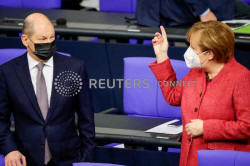German lawmakers turn sights on finance ministers in Wirecard fraud
fiasco
 Send a link to a friend
Send a link to a friend
 [February 02, 2021] By
John O'Donnell and Tom Sims [February 02, 2021] By
John O'Donnell and Tom Sims
FRANKFURT (Reuters) - Fresh from toppling
the head of Germany's top financial regulator last week, lawmakers are
turning their fire on finance minister Olaf Scholz and his deputy Joerg
Kukies.
As their inquiry into the collapse of Wirecard gathers pace, it has put
Germany's biggest fraud centre stage in national elections in which
Scholz wants to stand for chancellor.
"The focus of the parliamentary inquiry will more and more shift to the
role of Scholz and his ministry," Florian Toncar, a lawmaker involved in
the investigation said.
The inquiry into the implosion of a payments company which was once
worth $28 billion and hailed as a German success story has embarrassed
the country's governing centrist coalition.
Scholz and Kukies, who deny responsibility for failings which led to
Wirecard's collapse, have responded with reforms to the structure and
leadership of financial watchdog BaFin.

They presented further details on Tuesday, including plans to make it
more agile in responding to whistleblowers, giving the agency, Scholz
said, "more bite". [L8N2K83ND]
But lawmakers are growing impatient, with some such as Danyal Bayaz
saying Scholz has been slow to respond.
"The tough questions about political responsibilities only start now,"
Fabio De Masi, one of the lawmakers driving a parliamentary inquiry into
the affair, told Reuters.
Scholz's Social Democrats (SPD) have been in a coalition government with
Angela Merkel's Christian Democrats (CDU) for years and he hopes to
succeed her as chancellor in elections later this year following her
decision to retire.
But the SPD is struggling with voters, polling a distant third behind
the CDU and the Greens, while criticism of Scholz is also emanating from
within Merkel's party.
"Consequences for the finance ministry are now overdue," CDU
parliamentarian Hans Michelbach said.
KUKIES CONNECTIONS
Kukies' role has also come under close scrutiny and lawmakers have
highlighted multiple discussions he held with regulators, Wirecard
executives, bankers and others.
[to top of second column] |

German Chancellor Angela
Merkel speaks with German Finance Minister Olaf Scholz as they
arrive to attend a session at the lower house of parliament
Bundestag in Berlin, Germany, December 9, 2020. REUTERS/Hannibal
Hanschke

The Finance Ministry said these were part of his job.
Lawmakers say they also want to examine a 100 million euro ($121 million) loan
to Wirecard by a subsidiary of state bank KfW in September 2018, some two years
before its collapse.
One person with knowledge of the matter told Reuters that the money was
unsecured and that 90% of the loan by KfW's IPEX bank had been written off.
The finance ministry said that the bank's supervisory board, on which Kukies
sat, was not involved and learned of the loan only in the middle of last year.
The lawmakers are also calling for details of communications between Kukies and
the CEO of Goldman Sachs in Germany, his former employer, De Masi said.
Goldman Sachs declined to comment, referring to Wolfgang Fink's statement that
he had no contact with officials on Wirecard.
The Finance Ministry also said there had been no contact.
German lawmakers are not the only ones to see the root cause of BaFin's problems
in the finance ministry, a weakness also flagged by European regulators last
year.
Hans-Peter Burghof, a professor at the University of Hohenheim, said the
ministry had years ago hired many of the agency's top staff. "They lost this
spirit of independence."

($1 = 0.8288 euros)
(Additional reporting by Patricia Uhlig in Frankfurt, Christian Kraemer and
Michael Nienaber in Berlin; Editing by Alexander Smith)
[© 2021 Thomson Reuters. All rights
reserved.] Copyright 2021 Reuters. All rights reserved. This material may not be published,
broadcast, rewritten or redistributed.
Thompson Reuters is solely responsible for this content. |